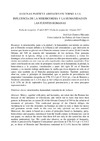Please use this identifier to cite or link to this item:
https://accedacris.ulpgc.es/jspui/handle/10553/55886
| Title: | Algunas particularidades en torno a la influencia de la misericordia y la humanidad en las fuentes romanas | Authors: | Zamora Manzano, José Luis | UNESCO Clasification: | 560204 Derecho de la antigüedad 560203 Filosofía del derecho |
Keywords: | Misericordia Humanidad Tratamiento de reclusos Mercy Treatment of prisioners, et al |
Issue Date: | 2017 | Journal: | Vergentis: revista de investigación de la Cátedra Internacional conjunta Inocencio III | Abstract: | La misericordia, junto a la piedad y la humanidad, son tenidas en cuenta por el Derecho romano debido a la influencia del cristianismo y que derivaron en normas que tienen su génesis en el Derecho romano como el canon 20 del Concilio Orleans del 549 en materia del tratamiento de los reclusos. Este precepto tradicional de la Iglesia, obliga a los archidiáconos o arcedianos a visitar los domingos a los reclusos con el fin de volcarse en ellos por misericordia y garantizar ciertas necesidades en este caso no sólo espirituales sino también materiales. Este canon está basado en una serie de principios basados en la humanidad, la piedad, la benevolencia y la aequitas, introducidos a partir del siglo IV en el Derecho romano, y en nuestro trabajo analizamos la huella que éstos dejaron no solo en el canon sino también en el Derecho penitenciario moderno. También podremos observar, como el principio de humanidad, que se percibe de providencias del emperador Constantino recogidas en CTh. 9.3.1.pr= C.9.4.1 pr., o las de Honorio y Teodosio contenidas en C.1.4.9, deja su fiel reflejo en artículos como el art.6 de la L.O. 1/79, de 26 de septiembre Ley general penitenciaria y en otros preceptos supranacionales. Mercy, together with piety and humanity, are taken into the Roman law because of the influence of Christianity and which led to rules that have their genesis in Roman law as canon 20 of the Orleans Council of 549 in the relation of treatment of prisoners. This traditional precept of the Church obliges the Archdeacon to visit the prisioners on Sundays in order to turn to them for mercy and guarantee certain needs in this case not only spiritual but also material. Moreover, this canon is based on a series of principles based on humanity, piety, benevolence and aequitas, introduced from the fourth century in Roman law; and in our paper, we analyze the traces that these left not only in the canon but also in modern penitentiary law. We could also observe, as the principle of humanity, which is perceived by Emperor Constantine's provisions in CTh. 9.3.1.pr = C.9.4.1 pr., or those of Honorio and Theodosius contained in C.1.4.9, leaves his faithful reflection in articles as art.6 of the L.O. 1/79, of 26 of September General Penitentiary Law and other supranational rules. |
URI: | https://accedacris.ulpgc.es/handle/10553/55886 | ISSN: | 2445-2394 | Source: | Vergentis: revista de investigación de la Cátedra Internacional conjunta Inocencio III. [ISSN 2445-2394], nº 4, p. 297-324 | URL: | http://dialnet.unirioja.es/servlet/articulo?codigo=6325037 |
| Appears in Collections: | Artículos |
Page view(s)
174
checked on Jan 15, 2026
Download(s)
100
checked on Jan 15, 2026
Google ScholarTM
Check
Share
Export metadata
Items in accedaCRIS are protected by copyright, with all rights reserved, unless otherwise indicated.
